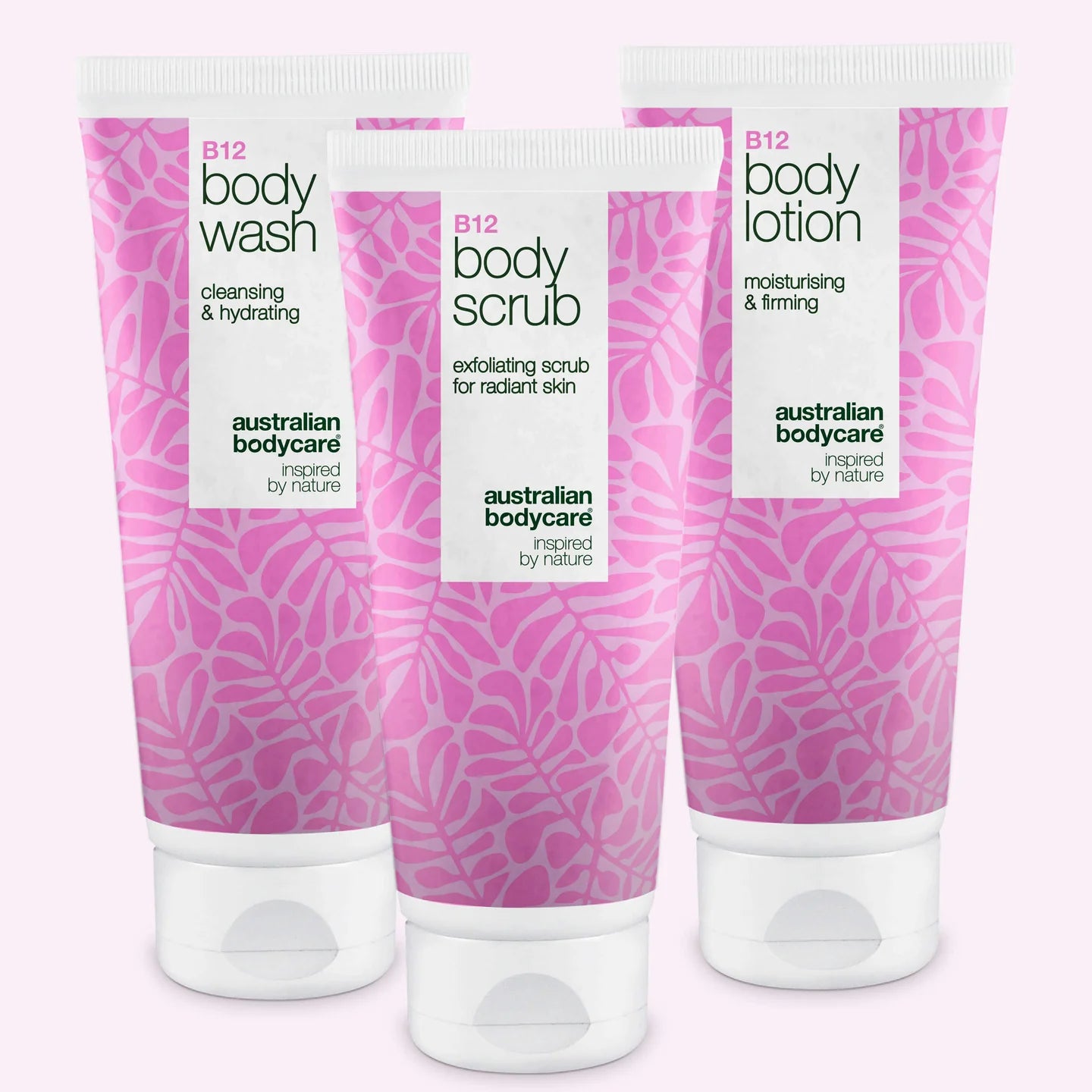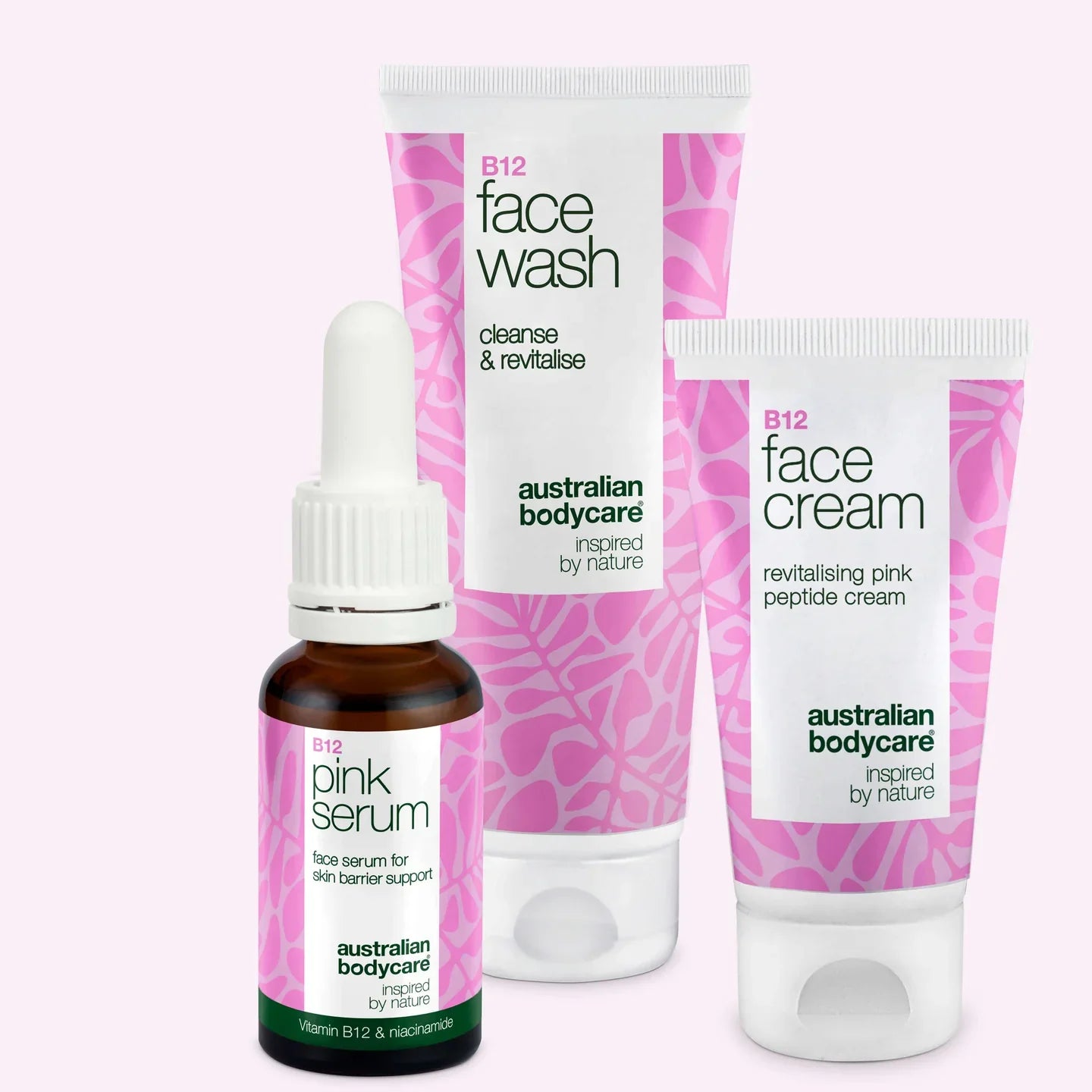How to Use Tea Tree Oil for Acne prone skin
Acne can be frustrating, maddening and knock your confidence. When you suffer outbreaks seem to happen at the worst possible moments – it’s embarrassing.
It can make you feel like a teenager, like an outsider, like the odd one out.
Knowing the right acne calming skincare steps, will help you take back control.
Table of contents
What is acne?
Acne is scientifically defined as a chronic inflammatory skin disease. Chronic describes acne as being an on-going, long term skin condition and inflammatory describes the way your immune system reacts to create inflamed, pink-red acne spots.
Acne is a disease of your hair follicles/pores and your sebum/oil glands. Acne needs a combination of 3 things to begin.
First, your skin over secretes sebum or oil, which is why oily and combination skin types are prone to developing acne.
Secondly, your skin will not exfoliate quickly enough – usually your skin cells almost completely sheds every 30 days. When natural exfoliation slows, dead skin cells become trapped inside your pores.
Finally, pore filled plugs of oil and dead skin cells become food for acne causing bacteria – Propionibacterium acnes. As these bacteria grow, they release a type of protein your immune system reacts to, this causes inflammation, which you see as a spot, pimple or acne.
Acne is very common during puberty as hormone changes cause skin to become oily, beginning the acne causing cycle.
This is also the reason why women can become prone to acne breakouts during their monthly cycle.
However, acne does not just affect teenagers and is not just linked to hormone changes during menstruation.
Acne is also becoming more common in adults the cause of which can be related to stress, diet, lifestyle and other stressors.
If you have acne, your skin will be plagued with inflammatory spots – these are easy to identify as they cause pink-red inflammation.
They can be painful, they may form a pus filled head, and they may leave brown marks of hyperpigmentation when healed.
Read More About: 5 Benefits of Tea Tree Oil for Skin
Why use Tea Tree Oil?
Tea Tree Oil is a natural antiseptic extracted from the leaves of the Australian tea tree. It can help counteract bacteria and microbial growth making it especially useful in the battle against acne prone skin.
When one cause of acne is removed, acne cannot take hold of your skin. Using Tea Tree Oil helps counteract your skin’s growth of Propionibacterium acnes – the bacteria which cause acne.
A properly diluted Tea Tree Oil product will firstly help counteract your acne and secondly help prevent it. As an essential oil, Tea Tree Oil can very effectively work its way into your pores.
This is where acne forms and therefore where your acne treatments need to reach. Water is repelled by oil, exactly like a magnet, but oil loves oil, making Tea Tree Oil the perfect solution for oily, acne prone skin.
When using Tea Tree Oil it mixes with our skins natural oil and it prevent the blocked pore becoming “food” for the acne causing bacteria. Without this the acne bacteria cannot grow and therefore acne can be prevented.
Tea Tree Oil is also effective in speeding your skin’s healing process. Have you ever been trapped in a cycle of acne spots which only seems to heal as the next ones crop up?
Tea Tree Oil can help. As an antiseptic, Tea Tree Oil can inhibit harmful bacteria from growing in your acne spots, this means your skin can heal quickly.
Read More About: Is Tea Tree Oil good for spots?
How to use Tea Tree Oil for acne prone skin
Getting rid of your acne means treating at least one or even better 2 or 3 of the causes of acne. This means acne causing bacteria, excess skin oil and poor or slow exfoliation.
Therefore proper skincare practises can have a very positive effect on getting rid of your acne prone skin.
Firstly, all effective acne fighting skincare routines must contain an efficient cleanser i.e. a cleanser with Tea Tree Oil.
Skin that is cleansed thoroughly is not as able to hold onto dead skin cells. Cleaning removes both excess skin oil and trapped dead skin cells. Cosmetic products like sunscreen, BB cream and foundation can also help prevent dead skin cells from shedding, causing them to become sticky and therefore unable to shed.
Cleansing skin daily can help prevent this from happening.
Pro-Tip: It is important to choose a cleansing product designed for oily, combination, acne prone skin. Products with Tea Tree Oil are the perfect choice.
After cleansing your skin, it can be helpful to use a face mask. Clay based face masks, like our clay based face mask with natural Australian Tea Tree Oil, are best for the job. Clay helps absorb excess skin oil drawing it from deep inside pores. Choose our clay based face mask and your skin will benefit from the Tea Tree Oils natural antibacterial action as well exfoliation from the sandalwood nut shells to help remove dead skin cells and prevent acne.
One product with 3 clear benefits.
Using an acne counteracting moisturiser is also very important in the prevention of your acne. When you have acne prone skin, using a moisturiser can feel like the last thing you want to do.
Your skin already feels oily, so why would you need or want to moisturise? The not so well-known secret is that oily skin types are often deficient in a certain type of oil and therefore not moisturising only worsens your oily skin and acne.
Oils such as rosehip and grapeseed oil are high in the type of oil your skin lacks.
To moisturise your skin, you can make an at home blend of rosehip oil with Tea Tree Oil at a proper dilution. Or alternatively you could buy a moisturiser with both ingredients.
Using a moisturiser before bed will have most effect on your skin as this is when your skin makes less oi allowing moisturiser to absorb.
Finally, acne spots which have already formed can be spot treated with a Tea Tree Oil treatment product. Acne spots often need an extra concentrated dose of active ingredients to heal quickly, therefore using a treatment product which can be specifically applied to these areas will help you get rid of acne more quickly.
Spot treatment products which use antiseptic Tea Tree Oil are very effective and naturally active.
Read More About: Is tea tree oil good for skin?
Use a cover stick concealer
While you’re waiting for your new skincare routine to help you get rid of acne, cover stick concealers are your perfect solution.
Unlike most foundations which lack the coverage needed to cover acne spots, cover stick concealers use a higher amount of pigment ingredients to help hide and camouflage your existing acne spots.
To use simply apply to the areas of your skin effected by acne and blend delicately.
While you may think of concealers as separate from skincare they can also have acne counteracting effects. When choosing a cover stick concealer look for one containing Tea Tree Oil. As you’re applying the product directly to your spot, it’s positioned perfectly to conceal, treat and counteract your acne.
How to prevent acne
Acne does not have to define your life if you make the right skincare, diet and lifestyle choices to help prevent it. How does your approach match up? Are you following all points below to help you get rid of acne?
1. Use Tea Tree Oil skincare.
Tea Tree Oil is a natural antiseptic which is helpful against acne prone skin. Tea Tree Oil can be easily found in skincare products, it’s helpful in a cleanser and even more helpful in leave on products such as toners, moisturisers and spot treatments.
2. Exfoliate your skin regularly.
Acne bacteria breed from dead skin plugs found inside your skin’s pores. It’s easy for them to become trapped when you have an oily skin type. Everyone’s skin is constantly exfoliating, however oily and combination skin types find it harder to shed dead skin cells. Exfoliating your skin regularly helps speed up your skin’s natural exfoliation rate, preventing dead skin plugs from forming and therefore acne bacteria from growing.
3. Use the right oils for your skin type.
It’s a mistake not to moisturise acne prone skin, instead you should be using an acne fighting moisturiser. Skin studies have shown that oils high in linoleic acid actually help reduce spot size as well as the number of spots skin develops. Moisturisers designed for acne prone skin types should contain oils like rosehip and grapeseed as well as acne counteracting ingredients like Tea Tree Oil.
4. Follow a low sugar/low-GI diet.
Hormones are closely related to acne because specific hormones cause your skin to become oilier. Hormones can change naturally during puberty and menstruation however they can also be affected by food. For example insulin is a hormone released when you eat high sugar foods. When it’s released it’s accompanied by another hormone called insulin-like-growth-factor (IGF-1), a hormone able to activate your oil glands into making more oil. Sugary snacks are easy to spot, however high GI foods like crisps, white potatoes and white bread are often over looked.
5. Eliminate dairy.
Dairy can also cause your hormone levels to alter. Firstly it contains sugar and secondly it naturally contains hormones as it’s designed to help calves grow. Eating dairy can help increase the hormones which help acne grow.
6. Moderate your stress levels.
The brain-skin connection is real. Stress directly affects your immune system making it less able to fight disease. Acne is a skin disease and therefore in times of stress, the condition can worsen. Exercise and rest are both great ways to moderate your stress levels. Muscle and breathing based exercises such as yoga and Pilates are a great solution.
4 Steps For A Better Face Skin
Frequently Asked Questions About Tea Tree Oil Acne
What is acne?
Acne is a chronic inflammatory skin disease which is created by a combination of 3 factors; excess skin oil/sebum, trapped dead skin cells and acne causing bacteria. Acne often begins in puberty as hormone changes can increase skin’s oil production however adult acne is now also extremely common.
What is Tea Tree Oil?
Tea Tree Oil is a natural antiseptic which can be used to help counteract spots, acne prone skin, skin infections and more.
How to dilute Tea Tree Oil for acne?
Most store brought acne counteracting Tea Tree Oil products use between 0.1 to 1% concentrations of Tea Tree Oil. At home blends can be made by following this dilution. Use for example 99 grams of rosehip oil with 1 gram of Tea Tree Oil. Be sure to follow the dilution instructions given on your bottle of Tea Tree Oil.
Where to buy Tea Tree Oil for acne
Tea Tree Oil can be brought online or from a reputable pharmacist or drugstore. When purchasing it’s best to look for an Australian Tea Tree Oil which most often has a high content of terpinen-4-ol, the main active in Tea Tree Oil.
What causes acne
Acne is caused by a combination of 3 factors; increased oil production, trapped dead skin inside of pores and an increase of acne causing bacteria – Propionibacterium acnes. Acne begins inside pores; where oily dead skin plugs grow acne causing bacteria, causing inflammation and acne spots.
How to cover up acne
Acne is best covered with a cover stick concealer which is non-comedogenic i.e. it does not block pores, and which contains an acne counteracting ingredient like Tea Tree Oil. Cover stick concealers can be used directly on acne spots to camouflage their appearance.
Does coconut oil help acne
Coconut oil contains almost 50% of an ingredient called Lauric acid which is anti-septic but can also block pores i.e. it’s comedogenic. Lauric acid might help prevent the growth of acne causing bacteria however it may also block pores, worsening the condition. Acne prone skin type should avoid coconut oil in preference for oils like rosehip oil.
Does toothpaste get rid of acne
Toothpaste is drying to skin and can therefore dry out spots, pimples and acne. It’s not recommended as a treatment for acne as drying skin is irritating and may cause inflammation. Acne is an inflammatory condition so inflammatory skincare should be avoided.
Does stress cause acne
Stress cannot cause acne, but stress may provoke or worsen acne. Stress affects the body’s immune function and therefore inflammatory skin diseases like acne may worsen or rear during times of stress.







